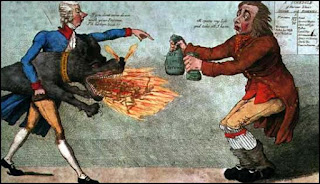Framing is everything. It is the context. 'The Endowment Bias' shows that people are willing to pay less for something that isn't already theirs, than they are willing to sell the exact same thing. The experiments to show this used Mugs. Some people were offered bugs, then offered money for the mugs. Others were offered money, then asked if they wanted to buy the mugs. Our money decisions are emotional.
Modern Income Tax was introduced in the United Kingdom 1799 to pay for equipment for the French Revolutionary War. It was supposed to be temporary, and was turned on an off till it was turned off in 1816 after Waterloo. Peel brought it back again in 1842 and it became a permanent feature of the British Taxation system.
The problem with Income Tax is it gives the impression that you have been given the Mug. It creates a class of 'Tax Payers' who feel entitled to make decisions about how the money is spent. It gives the impression of Givers and Takers.
With huge countries, being a Tax Payer becomes an identity and creates barriers between between people. It becomes abstract. Instead of a pool of money amongst your community, it becomes someone taking what is yours.
I prefer Consumption Taxes. To me that feels more like you are paying a fee to society for creating the opportunities that you have benefited from. You pay for something you want. Don't want it, don't pay. Income Tax feels like someone is taking something from you.
If you imagine the world/your country was just 150 people, the dynamics change. Instead of an abstract Giver and Recipient, people have names, faces, and stories. It isn't 'you vs. the Man', 'you vs. the State' or 'you vs. them'.
A group of 150 could have 75 people paying in more money than they are receiving, because they are part of a community. Instead of transactional, it becomes relational. We know that some people bring in money, and other people do other things. Suddenly people know each other, and that changes the framing.
A Community Wealth Fund (CWF) could be built up by those 150 people as an Engine for the Community. Eventually, that CWF could pay everyone a Universal Basic Income. If that went viral, a sufficient number of CWFs would ensure no one was left out of society. Not in an abstract way. In a way where we saw each other. Where we knew each other. That is a world I want to live in.
Mug Shot


No comments:
Post a Comment